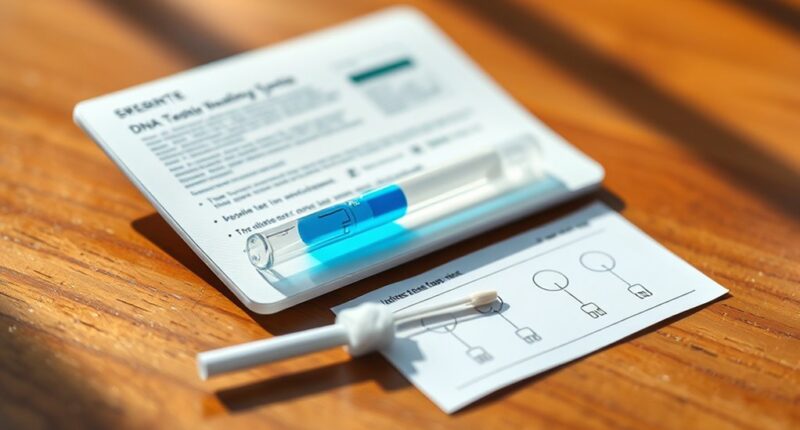23andMe offers you direct-to-consumer genetic testing that provides personalized insights into your health, ancestry, and wellness. It empowers you to take control of your genetic information from home, but you should also consider privacy, ethical, and interpretative aspects. While the service can reveal useful details, results aren’t always definitive and may cause concerns if misunderstood. To understand how to navigate these features safely and responsibly, keep exploring what’s involved beyond the basics.
Key Takeaways
- 23andMe offers direct-to-consumer genetic testing to provide personalized health, ancestry, and trait insights from home.
- The service emphasizes privacy through encryption but involves sharing data with third parties, raising confidentiality concerns.
- Genetic information can reveal health risks and familial details, necessitating careful ethical and legal considerations.
- Test results are informative but not definitive diagnoses; misinterpretation can cause undue anxiety or false reassurance.
- Users should stay informed about data policies and responsibly balance the benefits of personalized medicine with privacy and ethical risks.

Imagine gaining detailed insights into your health and ancestry simply by submitting a DNA sample. 23andMe makes personalized medicine accessible to consumers by offering direct-to-user genetic testing services. You can learn about your genetic predispositions, inherited traits, and even uncover your ancestral roots—all from the comfort of your home. This convenience is revolutionary, empowering you to take control of your health journey. However, as you explore this new frontier, it’s essential to consider the broader implications, especially concerning genetic privacy and ethics. Sharing your genetic information with a commercial company raises questions about how your data is stored, used, and protected. 23andMe states they prioritize user privacy, employing encryption and strict security measures. Still, no system is entirely infallible, and the possibility of data breaches or misuse remains a concern. You might wonder who has access to your genetic data and for what purposes. Will it be used solely for your health insights, or could it be shared with third parties, like research institutions or pharmaceutical companies? Transparency about data policies is vital, and you should carefully review the company’s privacy agreements before submitting your sample.
Beyond privacy, there are ethical implications tied to consumer genetic testing. Your genetic information isn’t just data; it’s deeply personal and may reveal sensitive details about your health risks or familial relationships. It raises questions about how this information could impact your privacy rights or lead to discrimination, particularly in employment or insurance contexts. Although laws like the Genetic Information Nondiscrimination Act (GINA) protect against some of these risks, gaps still exist. Additionally, the potential for misinterpretation of genetic results can cause unnecessary anxiety or false reassurance. You need to approach these tests with a critical eye, understanding that they provide insights, not definitive diagnoses. Recognizing the role of genetic data in health insights can help you better interpret your results and avoid misconceptions.
As you consider using 23andMe, weigh the benefits of personalized health insights against the possible ethical and privacy challenges. Be proactive in understanding how your data is handled and stay informed about your rights. Remember, the power of genetic testing lies in its ability to enhance your understanding of yourself, but it also comes with responsibilities—both personal and societal. Making informed choices about sharing your genetic information ensures you can enjoy the advantages of this groundbreaking technology while safeguarding your privacy and respecting ethical boundaries.
Frequently Asked Questions
How Accurate Are 23andme’s Health Reports?
You can generally trust 23andMe’s health reports for genetic accuracy, but keep in mind that reporting reliability varies. These tests identify common genetic variants linked to certain health conditions, yet they don’t cover all possible factors. While the results can offer useful insights, they shouldn’t replace professional medical advice. Always consult a healthcare provider for a thorough understanding of your health risks and genetic information.
What Are the Privacy Risks of DNA Testing?
You face privacy risks with DNA testing, such as genetic discrimination by employers or insurers. Your data security is essential, but breaches can happen, exposing your sensitive genetic information. Be aware that companies might share your data with third parties or government agencies if required. Protect yourself by understanding privacy policies, opting out of data sharing, and staying informed about how your genetic information is stored and used.
Can 23andme Predict Future Health Conditions?
Yes, 23andMe can provide insights into your genetic predisposition for certain health conditions. However, it doesn’t predict future health outcomes with certainty; lifestyle influence plays a significant role. You might learn about inherited risks, but your habits, environment, and choices also shape your health. Keep in mind that these reports are not definitive diagnoses but helpful tools to understand potential genetic factors affecting your well-being.
How Does 23andme Compare to Medical-Grade Genetic Testing?
You won’t get the same detailed insights from 23andMe as from medical-grade genetic testing. While 23andMe offers ancestry analysis and some health reports, it doesn’t provide extensive genetic counseling or diagnostics for medical conditions. Medical-grade tests are more precise, often used by healthcare professionals to detect specific genetic mutations, whereas 23andMe is better for general ancestry and wellness info. For medical concerns, consult a healthcare provider or genetic counselor.
Are There Any Legal Restrictions on DNA Data Sharing?
Think of your DNA as a treasured book, and genetic privacy as its locked cover. Legally, data regulation varies by country, but many laws protect your genetic privacy, restricting how companies share or sell your DNA data. You have rights to control your genetic information, ensuring it’s not shared without your consent. Stay informed about local laws to keep your data safe and secure from unauthorized sharing.
Conclusion
So, now you know that spitting in a tube can reveal your genetic secrets—no lab coat needed. With 23andMe, you’re basically a walking, talking science experiment, just waiting for your personalized health forecast. Who knew that uncovering your DNA could be as simple as sending a swab? Just don’t blame us if you start obsessing over your genetic quirks—after all, it’s all in the name of “personalized” medicine, right?








